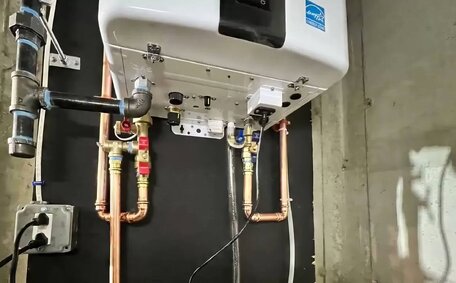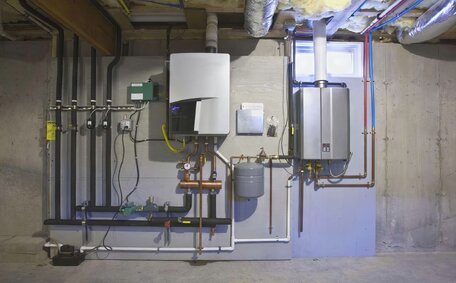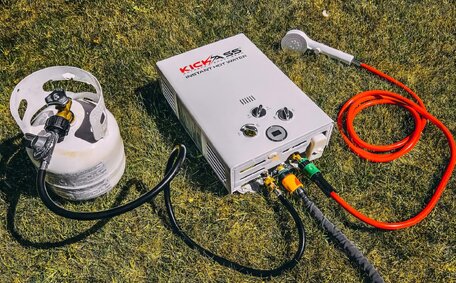Instant and Precise Control for Gas Cooking
One of the standout benefits for a commercial kitchen is the instant and precise control cooking gas allows.
Gas burners can be adjusted from a rolling boil down to a bare simmer in seconds, simply by turning the knob. This temperature control empowers home cooks to achieve better results with dishes that call for careful regulation, like braising meat or reducing sauces.
Professional chefs often prefer gas appliances of stainless steel, and reasons for this preference include its adaptable nature for culinary artistry. Wok tossing, tempering chocolate, sautéing vegetables - all become easier with a gas flame’s adaptable nature. Compared to electric range options with their gradual, incremental heat changes, gas puts cooks firmly in command.
For stir-fries in particular, a commercial gas range cooktops concentrated 15,000+ BTU power allows the intense heat needed to properly sear ingredients while retaining texture. Control and intensity combine to create restaurant quality outcomes in your own kitchen.
Faster Cooking Times and Energy Efficiency
Gas stoves heat up faster than electric alternatives, reaching full cooking temperature within seconds. It also enables quicker boiling, simmering, sautéing and searing.
This responsiveness can help save time across your daily cooking tasks, which is important in busy households. While the burners are engaged, your cooking with gas emits more heat energy than any other type of electric coils. Due to their rapid heat-up and cool-down times, gas stoves generally consume less energy in everyday kitchen use.
Enhance the efficiency of your gas cooktop with these tips:
- Match pan sizes to burner width to optimise heat transfer
- Use lids to retain heat during cooking
- Have burners turned off several minutes before intended finish time
- Keep reflectors and burner caps clean for optimal performance
Cost-Effectiveness of Cooking with Gas
Cooking with gas is the way go for significant cost savings compared to electric ranges. Gas cooking stoves generally cost less to operate on an ongoing basis.
The Independent Pricing and Regulatory Tribunal (IPART) has reported stable natural gas prices in the Sydney area over the past five years. So homeowners can depend on reasonable stability in their natural gas expenses moving forward.
Over time, using a gas stove for daily cooking tasks accumulates to substantial savings - especially for larger families. Gas oven units also heat up faster compared electric units, which further improves energy efficiency. And can also mean, in the event of a power outage, that a gas range still operates, allowing you to cook meals.
However, regional price fluctuations in Australia could affect natural gas affordability. The development of local gas resources can impact pricing over the longer term. So natural gas expenses may potentially rise or fall to some degree in coming years in the Croydon Park environs.
But even with some volatility, when it comes to cooking, natural gas appliances generally offer compelling benefits gas cooking enthusiasts appreciate, maintaining a commanding lifetime cost advantage over electric models. Gas also provides quick temperature adjustments, uniform heat distribution, and high heat output for cooking.
Versatility for Various Cooking Techniques
One of gas cooking’s main advantages is its exceptional versatility across various techniques. From a rolling boil for pasta to the lowest simmer setting for sauces, gas puts precise control at your fingertips.
Gas ovens are well-suited for a range of cooking methods from roasting and baking to broiling, thanks to their even heat distribution.
For example, gas ovens bake cookies to perfection, achieving a crisp bottom and chewy centre. Pies and casseroles brown evenly without hotspots, showcasing the advantage between gas electric cooking methods. And meats can char on the outside while staying tender within.
In addition, the open flame of a gas cooktop can impart flavorful smokiness to dishes like stir fries. Professional chefs rely on the intense, concentrated heat of gas stoves for signature dishes such as sizzling fajitas.
Gas models provide the versatility needed for a variety of cooking techniques, from low'n'slow braising to creating wok-charred stir fries – all with delectable outcomes.
Environmental Impact Comparisons to Electric
When weighing the eco-friendliness of gas versus electric stoves, both have pros and cons. Gas burners produce lower carbon emissions while cooking due to their energy efficiency. But rather than focusing solely on stove performance, consider the overall lifecycle impacts, because gas also includes methane leak and supply chain considerations with natural gas.
Electric models powered by renewable energy represent the most sustainable option currently available. However, in regions reliant on coal for electricity, like Eastern Australia, gas can be competitive or even more eco-friendly due to lower emissions from electricity generation.
For households aiming to reduce their eco-footprint, gas electric induction stoves paired with rooftop solar panels is an optimal solution. This setup decreases cooking emissions to near zero through clean renewable energy. It eliminates the need for gas line infrastructure while retaining responsiveness similar to gas during cooking.
As Australia’s electricity grid shifts towards more renewable sources over the coming decade, electric appliances will become progressively more eco-friendly. Gas networks may transition towards hydrogen or bio-methane as well to address sustainability concerns.
Currently, cooking with natural gas has a minor emissions advantage over electric cooking methods. Homeowners should consider their personal priorities and access to renewables when it comes to choosing between gas and electric stoves.
Safety Considerations for Gas Appliances
Using gas appliances safely requires proper installation, maintenance, and operation. As gas fittings experts, we at Croydon Park Plumbing emphasise several key safety considerations.
Avoiding Gas Leaks
Should you suspect a leak, vacate the premises immediately and alert the fire brigade and a licenced gas technician.
Faulty connections or damaged lines can lead to hazardous leaks. Potential gas leaks present one of the largest risks with these appliances. Signs include a 'rotten egg’ smell and visible condensation or discolouration on pipes.
Proper Installation & Maintenance
Gas appliances must be installed to strict specifications by qualified technicians. We advise homeowners to make sure they use licenced experts like our team. Likewise, repairs or maintenance should only be performed by licenced gas fitters.
Following the manufacturer guidelines for cleaning and upkeep is also vital. This keeps components like burners and pilot assemblies working safely and efficiently over the long term.
Flame Control & Ventilation
Always attend to a lit gas burner, ensuring it’s never left alone. Take care when working over open flames, avoiding loose clothing. And ensure your kitchen and appliances have adequate ventilation according to local council regulations.
Installing and regularly testing gas alarms provides an extra protective measure. But proper usage and working order of appliances remains the first line of defence for safely enjoying the benefits cooking with gas offers.
Maintaining Good Indoor Air Quality
Good ventilation is crucial for maintaining indoor air quality in homes with gas stoves. When gas burns, it produces water vapour and trace amounts of air pollutants like nitrogen dioxide and carbon monoxide. Proper ventilation removes these contaminants and brings in fresh air.
Monitor Humidity & Install Exhaust Fans
Maintain indoor humidity below 50% using humidistat monitors. Operate high-CFM exhaust fans during cooking and explore alternatives to gas stoves where practical. Open windows regularly or install whole-house ventilation if lacking exhaust fans.
Service Appliances & Inspect for Leaks
Keep burners properly adjusted and service appliances annually. Check appliance connections for leaks every 6 months using gas leak detector spray. Never obstruct oven vents or ignore rotten egg smells which may indicate dangerous gas buildup.
Consider Sealed Stoves & Range Hoods
Sealed stove burners, which can limit release of combustion byproducts like nitrogen dioxide by over 50 times. Investing in units with electric spark ignition removes the pilot light contaminant source. And commercial-grade range hoods filter more airborne residues during stove operation.
Following expert guidance on ventilation ensures homeowners can safely harness the precision cooking benefits of gas while maintaining excellent indoor air quality.
Gas vs Electric: Benefits for Home Cooks
When deciding between gas and electric stoves for your home kitchen, gas cooking stoves offer compelling advantages for cooking performance and versatility.
Gas burners heat up and adjust temperatures instantly. This responsiveness to adjust temperature quickly gives precise control for simmering sauces, frying eggs, and other tasks requiring careful regulation. By comparison, electric models have slower heating and cooling cycles.
The instant heat of gas also enables faster boiling, sautéing, and searing. You’ll spend less time waiting for elements to warm up to start cooking. And concentrated intense heat from a gas flame imparts delicious smokiness to dishes like stir fries.
Gas stoves are a better choice as they distribute heat evenly as well. This makes them highly suited for baking cookies, roasting meats, or anything needing uniform heating. Electric coils can create hot and cool spots by comparison.
Conversely, induction stovetops provide distinct advantages of their own. Their smooth surfaces are sleek and modern looking. Induction also matches gas’s responsiveness for rapid temperature adjustments.
Electric oven units avoid the ventilation considerations of gas to maintain indoor air quality. Though with proper fans and other measures, gas appliances can likewise keep homes fresh and safe.
When weighing up this gas vs electric stove analysis for your kitchen, factor in how you actually cook. Fans of braising, sautéing and Asian cooking favour gas for its versatility and authentic flavours.
Bakers prioritise even heating distribution. While minimalist cooks may opt for the seamless look of induction.
Dependability During Power Outages
One of the most useful benefits of gas ranges is their continued functionality during power outages. With gas appliances, you can still cook meals even with the electricity cut.
This capability provides welcome practicality for households in areas prone to electrical interruptions from storms and grid instability. It brings confidence that you can feed your family hot food no matter what disruptions occur.
Gas cooking’s independence from the electrical grid stems from its self-contained fuel source. As long as you use gas flowing to your home, you can turn on burners, light the oven pilot and cook just like normal.
Meanwhile, electric models become useless bricks without mains power. And while induction cooktops with their heating elements need electricity to generate their magnetic fields, gas flames burn steadily on, outage or not.
With increasing extreme weather events, having resilient gas appliances can prove invaluable. They offer reliable fuel for cooking basics like boiled water for coffee or eggs for breakfast when the lights go out.
Tips for Making the Most of Your Gas Cooktop
To fully leverage the precision and versatility of your gas cooktop, follow these tips:
Match Cookware Size to Burners
Using properly sized pots and pans ensures efficient, concentrated heat transfer on your gas stove top. Your cookware bases should be about the same width as the gas burner flames.
Clean Reflectors & Caps Regularly
Keep your reflectors and burner caps clear of food residue so gas flames distribute evenly for optimal efficiency and control.
Have Gas Fittings Professionally Serviced
Annual servicing by qualified technicians like Croydon Park Plumbing ensures safe, reliable performance. We check to get your fittings thoroughly for leaks or issues.
Our licenced experts, with more than a decade of experience, provide prompt repairs, maintenance, and installation for your gas stove in the Croydon Park area.
Reach out to Croydon Park Plumbing for all your plumbing needs and to learn more about upgrading to efficient gas cooking appliances.






